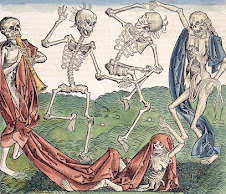Subscribe to:
Post Comments (Atom)
skip to main |
skip to sidebar
This is blog for students of History 102g - Medieval Civilization
Discussion Section Syllabus
History 102g, Medieval Civilization Discussion Section Syllabus
Fridays 9am, 12pm
TAs: Stacey Lutkoski & Ericka Swensson
Email: staceybl@usc.edu, emswensson@yahoo.com
Office: Shrine Offices
Welcome to the discussion section for History 102g. Discussion sections will examine and elaborate on the material presented through the lectures and readings. These classes will help us work through difficult concepts and problematize historical issues. As stated in the course syllabus, the discussion sections are worth 20% of your total course grade. Half of your discussion section grade will be determined by performance in the section itself. In order to receive full credit you need to be present at every class with the readings in hand, be an active participant, and demonstrate a familiarity with the sources.
Cell phone calls, tardiness, inappropriate use of laptops, and other disruptive behavior will not be tolerated and will adversely affect your grade.
Attendance is mandatory. Consult the course syllabus for more information on the attendance policy and penalties.
The second half of your discussion section grade will depend upon your performance in our class blog. Please email Ericka if you have not yet been added to the blog. This is your responsibility, and we will not be held responsible for your negligence. Each week we will post an assignment by Monday evening. You must post a thoughtful paragraph response on the blog by Thursday at 8pm. Late postings will not be accepted. We encourage you to use the blog not only as a place to express your ideas but also as a discussion forum by responding to your classmates’ postings. Your post should neither be a “fact” oriented question/ comment nor a question concerning the content of the works themselves, i.e.: a question that requires outside sources to answer. Rather, your response statement should deal exclusively with the contents of the texts themselves. Also, make sure that you cite the page(s) used for your question or comment.
This syllabus is subject to change. We will communicate with you outside of class primarily through email, and it is your responsibility to check your account regularly for pertinent information. If you have any questions or concerns, feel free to contact either one of us.
Any student requiring academic accommodations based on a disability is required to register with Disability Services and Programs (DSP) each semester. A letter of verification for approved accommodations can be obtained by DSP. Please be sure the letter is delivered to us as early in the semester as possible. DSP is located in STU 301 and is open 8:30am-5:00pm Monday through Friday. The phone number for DSP is (213) 740-0776.
2 comments:
Fame in the world of Beowulf is received differently by the people than it is in say the world of Saint Augustine. In Beowulf, fame and glory is something that is sought after with great difficulty and when achieved is held with great acclaim. Even the first few lines of the poem talks of the benefits of fame and power. However, in Beowulf, the people are famous for being men of action, not men of intellect as in Saint Augustine's time. In the poem, warriors are famed for being just that, fighters known for their bravery or treachery. In Augustine's world, people receive fame for being able to read and/or write. As in Augustine's encounter with Faustus, it is inferred through his perspective that anyone with any level of education is revered.
I think that the theme of fame in Beowulf is very important. Everyone knows who Beowulf is--he is "famous" in his world and around the world. I feel like fame is something that people strove for during that time, at least in this book, because everyone always talked about what their father's achieved and they felt that they were special because of what their family had done. This is a very different approach than Augustine in the Confessions, because Augustine never really talked about the fame of someone, except maybe two or three times, and I never felt like he REALLY looked up to his father and his accomplshments. So I don't think that fame played as much of a part there than it does in Beowulf.
Post a Comment